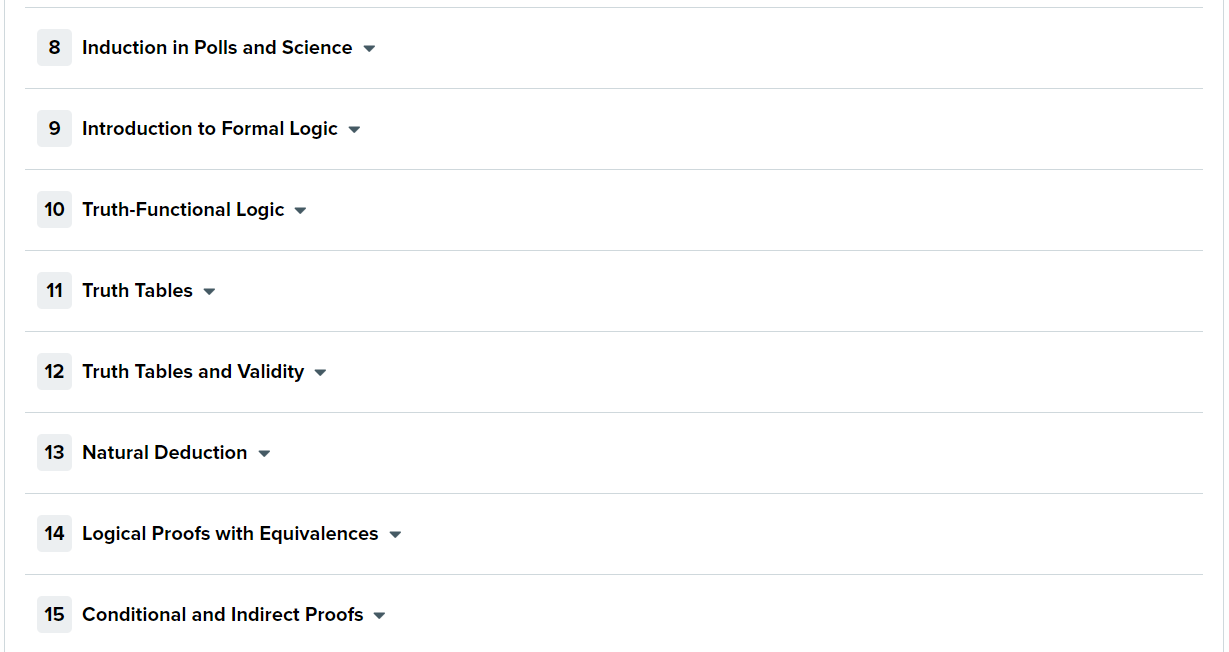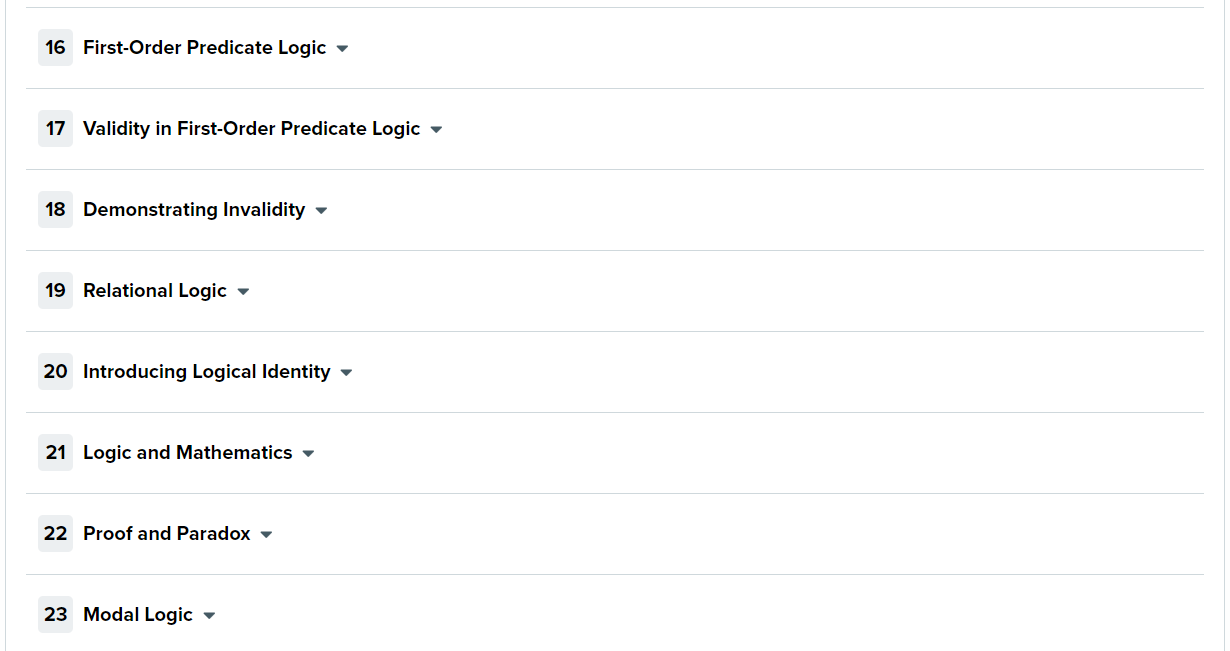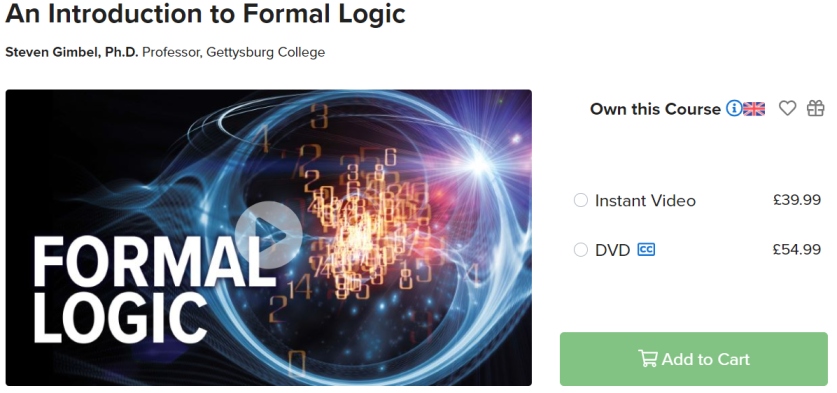Description
An Introduction to Formal Logic course. Flawed, misleading and incorrect arguments are everywhere. From advertisers who try to separate you from your money, to politicians who try to influence your vote, to friends who want you to agree with them, your belief structure is constantly under attack. Logic is an intellectual self-defense against such attacks on reason, as well as a method of quality control to check the validity of one’s opinions. But beyond these very practical benefits, informal logic—the kind we use in everyday life—is a gateway to a beautiful and fascinating branch of philosophy known as formal logic, which is philosophy’s equivalent of calculus. Formal logic is a breathtakingly versatile tool. Much like a Swiss army knife for the perceptive mind, it is a powerful research method that can lead to surprising and world-changing conclusions. In Introduction to Formal Logic, award-winning philosophy professor Stephen Gimbel of Gettysburg College, 24 engaging half-hour lectures that teach logic from the ground up, guides you with wit and charm through the full scope of this highly valuable subject. Fallacies of everyday thinking to advanced ideas in the boundaries of this field. Professor Gimbel’s research explores the nature of scientific reasoning and the ways in which science and culture interact, which positions him well to clarify and specify advanced abstract concepts. Filled with real-world examples and thought-provoking exercises, this course is suitable for everyone from beginners to seasoned logicians. Abundant on-screen graphics, along with ample explanations of symbols and proofs, make concepts clear. You’ll find that the same intellectual skills that help you spot weak points in sales or your child’s excuses for skipping homework will put you on the path to some of the most profound discoveries of our time, like Kurt Gödel’s incompleteness theorems. which shook the foundations of philosophy and mathematics in the 20th century and is comparable only to intellectual revolutions such as quantum mechanics. But Godel didn’t need a laboratory to make his discovery—just logic. A course with surprising breadth and depth of applications, Introduction to Formal Logic will appeal to:
- Critical thinkers who aspire to make better decisions, whether as doctors, lawyers, investors, managers, or others who are faced with the task of weighing conflicting options.
- Enthusiasts of intellectual history who want to trace one of the most influential and overlooked currents of thought from ancient times to the present day.
- Philosophy students for whom logic is the gold standard for evaluating philosophical arguments and the course required to master this discipline.
- Mathematics students who want to understand the foundations of their discipline and get a glimpse into the machinery that drives every written mathematical equation.
- Anyone curious about how computers work, because programs don’t know anything about words, sentences, or even numbers—they only understand logic.
- Those who are fascinated by language, the brain, and other cognitive science topics, because logic models language, meaning, and thought better than any other tool.
Professor Gimbel begins by noting that humans are designed to accept false beliefs. For example, we have a strong compulsion to change our point of view to fit the opinion of a group, especially if we are the only ones keeping it – even if we are sure we are right. From these and other cases of cognitive bias where our instincts work against correct reasoning, you can see how logic is a wonderful correction that protects us from ourselves. With this fascinating beginning, an introduction to formal logic unfolds as follows:
- Logical Concepts: You will become familiar with deductive and inductive arguments and the criteria used to evaluate them – validity and justification. Then you learn that arguments have two parts: the conclusion (what is being argued for) and the premises (the support given for the conclusion).
- Informal Logic: This type of logical analysis, often called critical thinking, looks at features other than the form of the argument – hence “informal”. Here, you focus on proving the truth of premises, as well as spotting standard rhetorical tricks and logical fallacies.
- Inductive reasoning: You will then learn to evaluate the validity of an argument using induction, which examines various cases and then forms a general conclusion. Inductive reasoning is an example of science, taking what we already know and logically allowing us to believe something new.
- Formal symbolic deductive logic: Known as “formal” logic because of its focus on the form of arguments, this family of techniques uses symbolic language to evaluate the validity of a wide variety of deductive arguments that draw details from rules or It deduces general principles.
- Modal Logic: After an intensive exploration of formal logic, you enter modal logic and learn to handle sentences that deal with possibility and necessity, called modality. Modal logic has been very influential in moral philosophy.
- Current Developments: You take the course by looking at recent developments, such as three-valued logic systems and fuzzy logic, which expand our ability to reason by denying what seems to be the basis of all logic – that sentences must be true or false. .
What you will learn in An Introduction to Formal Logic
- Learn about common logical fallacies such as circular reasoning, slippery slope, and oversimplification.
- Examine what makes deductive arguments valid.
- Use truth tables to test the validity of the famous form of reasoning called modus ponens and verify the conclusion.
- Follow the work of Hilbert, Cantor, Frege, Russell, and Gödel to prove that the logical consistency of mathematics can be reduced to elementary calculus.
Description of An Introduction to Formal Logic course
Course headings An Introduction to Formal Logic



Course images
Sample video of the course
Installation guide
After Extract, view with your favorite Player.
Subtitle: None
Quality: 720p
download link
File(s) password: www.downloadly.ir
Size
10.4 GB
